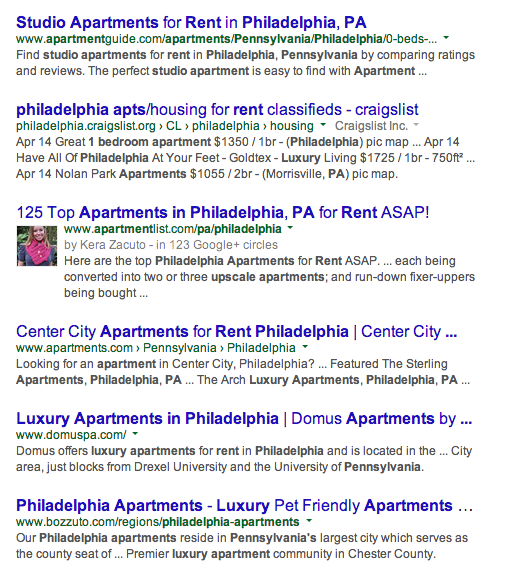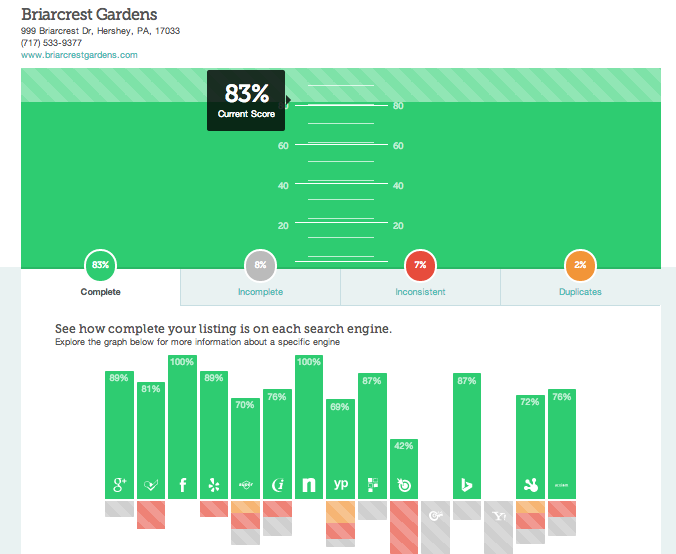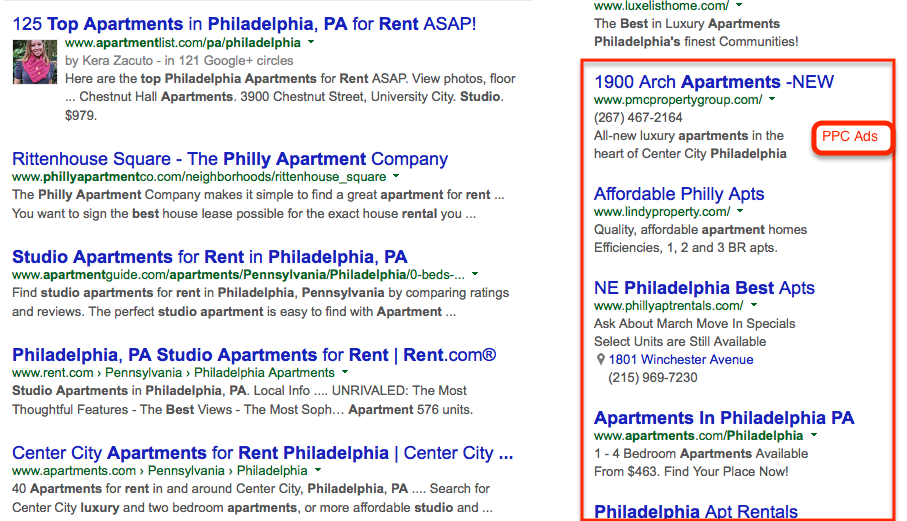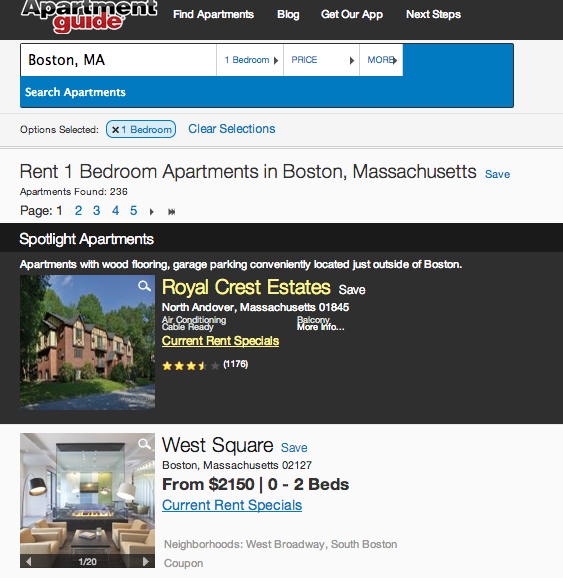Property managers have plenty of headaches without worrying about their search rankings online. However, without a good foundation in search engine optimization (SEO), your competitors will outrank you – translating into fewer applications and signed leases.
What is SEO?
Simply put, SEO is the art of getting your website to appear for the search queries that your target market enters into Google, Bing, etc. If your properties are located in Washington DC, you would want your website to rank for searches like “Washington DC apartments” or “apartments + zip code.” However, with sites like Apartments.com, ApartmentGuide, ForRent, Zillow, etc., you are going to be hard-pressed to get any search traction for a general search query like that. Of course, if you are in a much smaller market (Lancaster, PA vs. Philadelphia, PA), it will be easier to rank for those terms since competition is much lower.
Here are the search results for “Best Studio Apartments Philadelphia PA”. You can see that the top five organic results are all for rental aggregators that are both nationwide and city-specific. The only way individual property managers are getting search traffic for terms like these is through pay-per-click (PPC) advertising, which appear above organic search results and on the side bar of your search results page.
Instead, you will want to rank for “long-tail” keywords (more specific, longer search queries) like “best studio apartments in Denver, Colorado.” With Google’s Hummingbird Update, ranking for the long-tail phrases or conversational search queries is now possible since Google can easily interpret “phrases” and provide better search results. This means you don’t have to optimize your pages with keyword-heavy text, titles, or links. Instead, you can focus on user experience knowing that your site will rank just fine (and better) without over-stuffed keyword heavy pages.
Why Use Long-Tail Keywords?
Compare the previous search to the one for “luxury studio apartments Philadelphia PA.” While the rental aggregators are still commanding some of the top results, you can see that two different rental companies came into the top 10 results: Domus and Bozzuto. These two companies have targeted, long-tail keywords that work well for them since the rental companies probably don’t want search traffic from students looking for cheap housing. They have a very different target market, and they go after it using specific search phrases.

When someone begins a search for apartments in a specific area, they want to use a site like ApartmentGuide.com because they can get an idea of cost and see what options are available. From there, they will do more specific searches that include pricing and location keywords such as “affordable/cheap apartments” or “one bedroom apartments in ___”. Users searching phrases like these are more likely to call your property and submit an application because they are further into the decision process.
Local Citations
While many aspects of SEO are technical, a local business can still hold value simply by having a solid website, social presence, and local citations or links. All of these can be done without a technical background.
Just a few years ago, you could improve your rankings with any type of link because they impacted your rankings equally. Links are a large factor into search rankings as links are seen as “votes” of authority to your website. Five years ago, links that were irrelevant to your business could still help you rank, but Google has since devalued low-quality websites. Now SEO rankings are determined by relevant, quality links to your website.
For small and large property management companies alike, targeted, local marketing is key to success. A link from the New York Times won’t be as effective as a link from a local university recommending your property for grad students. SEO used to be about metrics, and value passed between links. Now SEO is much more focused on driving targeted, relevant traffic to your site. This is a welcome change, as it fits with the rest of your marketing strategy much better.
Here we’ll discuss actionable strategies you can implement to improve your rankings and brand awareness to fill those empty properties.
The Big 3: Google, Yahoo, Bing
The most important place to start in SEO is with the search engines themselves. If you haven’t claimed your property’s local listings on these search engines, this is the first step. For Google, simply search your brand and look for its red marker on the map. Hit “Manage this Page” or “Claim Business” and follow the steps to verify your business listing. To set up your Yahoo or Bing listings, sign up for the basic free listings. Here you can search for your property listing, claim it, and fill out all the information.
If you fill out your listing with the most information you can, it will stand out from other unclaimed business listings. Add pictures, descriptions, hours of the property management office, and more! If you can connect your social profiles, you should definitely take advantage of that feature.
Local Data Aggregators
Having your profile on Google, Yahoo, and Bing is great – but it isn’t enough. There are plenty of local websites that allow you to list your business. YellowPages, WhitePages, and Local.com are just a few examples. However, instead of spending hours getting listed on each of these sites, you can use a data manager like Yext or Moz Local to distribute your business listings to hundreds of websites. This also has the benefit of ensuring that your information is all the same – contributing to a stronger brand presence.
Overview of a Property from Moz Local
This is a simple process – simply visit either Yext or Moz Local (Moz Local has a bigger feed than Yext) and follow their instructions to claim all your business listings. Just like with Google, Yahoo, and Bing, fill out all the appropriate information and choose the appropriate categories for your properties. Look for categories like, “Commercial Property Management,” or “Residential Rentals,” “Apartments and Townhomes,” etc.
Both Yext and MozLocal will do an analysis of your brand’s listings online and tell you where you need improvement and what is already in good shape. Here I’ve run one of my properties, Briarcrest Gardens, through their search. The results show me where I’m doing well and what I need to improve. If I sign up for their service, it will take care of fixing all these issues for me. This is a handy tool that saves a significant amount of time for property managers.
Real Estate Websites
Beyond local listings, you will need to look for industry specific websites. Is your property listed on ApartmentGuide or Apartments.com? ApartmentGuide has about 2.9 million monthly visits, while Apartments.com comes in around 1.9 million a month. Both are huge markets. And if you aren’t listed, your properties are missing a lot of eyes. Here you can see a search for “1-bedroom apartments in Boston, MA.” The top “Spotlight Apartment” is a paid spot, and it rotates every few searches. While this is an expensive advertisement, it is sure to help you stand out in a highly competitive market like Boston.
Buildium’s rental listing syndication feature makes it simple to distribute your property information quickly. After you upload your specific properties, it will post your vacancies to websites like Zillow, Trulia, and even Craigslist. Additionally, when you remove properties that have been filled, Buildium’s software saves them for easy re-activation when they are again vacant.
Review Websites
Have you claimed your profile on Yelp, Merchant Circle, or Foursquare? This ties in to online reputation management, since you want to know what your audience is saying about your company. You can encourage reviews by leaving reviews for other business you’ve interacted with as well. Although you cannot offer compensation for reviews, it doesn’t hurt to encourage residents to leave a positive review. Make sure all your listing information is filled out correctly and that you are responding to any negative reviews in a prompt fashion. You should also respond to positive reviews with a personalized thank you and appreciation for their business.
Leverage Local Relationships
SEO can begin offline as well. It’s likely that you have an existing relationship with moving companies or realtors. Take that connection online and ask them to cite you as a resource on their website.
If you are a member of the local Chamber of Commerce, ensure that your business is listed with a link on their website. Check for local guides to your city that may have a list of places to live, and see if your properties can be included. Any local newspaper will have business directories for you to add your business. If there are any local universities, they will often have a list of off-campus housing opportunities for students to reference. If you want to rent to students, this is a great opportunity for you.
Anything unique about your properties can provide a lot of great linking opportunities. Section 8 leases, pet-friendly leases, short-term leases, and furnished apartments all can be listed in different directories of their own because people will often search for those keywords specifically.
Social Media & Forums
Social media can be a great way to communicate with your residents as well as attract new residents. Setting up a Facebook page or a Twitter account are both excellent ways to extend your brand’s reach and bring personality to an apartment complex.
While forums are not used nearly as much as they used to be, there is still some SEO value to be had. People looking to relocate will often post on a forum and ask questions about the area, schools, livability, and more. Forums for moms, grad students, and travelers are all options. While you may not get links out of it, you can still get the value of seeing what users are looking for, and mention your brand as a resource for them.
How to Set Up a PPC Campaign
While SEO is an organic (unpaid) effort to bring in search traffic, pay-per-click (PPC) marketing is the paid version of bringing traffic. Even a small PPC campaign can help get your brand out there and capture traffic.
Begin by targeting keywords involving moving queries (moving + city name) and target geographically to people in your region. Depending on your location, you may want to adjust your budget for seasonality. If you have properties near universities, increase your budget at the end of the summer when students are looking for housing.
Create separate local and statewide campaigns to target different keywords. Break your ad groups into demographics: students, young professionals, adults, families, seniors, and those searching for niche amenities such as pet-friendly housing, laundry on site, or low security deposits. Always create landing pages on your site and don’t use your homepage. Landing pages are unique pages on your website that give tailored information to the audience your PPC campaign is targeting. You wouldn’t want to show the same information to someone looking for a three-bedroom townhome versus a studio apartment. They both have very different needs, and you will have better conversions if you immediately provide the information your audience is looking for.
If you have promotions or special discounts, create an “offer” on Google AdWords. All ads should contain an offer and clear call to action to capture potential residents as quickly as possible. This could be an offer to receive a free month’s rent for signing a year contract. Having that important call to action (‘sign today for a free month’s rent’) will create a sense of urgency and likely result in more conversions. Conversions could be someone submitting a “Request More Information” form, placing a call to your leasing office, or subscribing to a newsletter.
Using Google or Bing Ads can be expensive if you aren’t using the right keywords or fine-tuning your ads to maximize your return on investment (ROI). It is very important to have landing pages and conversion points (i.e., a contact form) on your website to improve leads.
How Do I Know If I Am Being Effective?
While traditional methods of advertising are great, the advantage of digital marketing is that you are able to track your marketing efforts through analytics.
If you are new to Google Analytics (the free analytics tool from Google), it isn’t difficult to learn the basics. Once you have analytics code installed on your website, you can see demographic information about your visitors, web traffic over time, and the acquisition of visitors. You can segment them into direct traffic, visitors that come to your site through search queries, or referral traffic – visitors that come via a link on another website. Social media and PPC traffic are also recorded.
Analytics can also show you the top landing pages as well as the most popular content on your site so you can judge what pages you may need to adjust or eliminate.
One of the most important parts of Google Analytics is the conversion measurement. Sure, you know how many people call you or email you on a given day, but have you tracked how many leads your website is bringing in? In Analytics you can set up “goals” that track the number of users who fill out a contact form, download a rental application, or submit an application. There are plenty of tutorials that can show you how to set up a simple goal.
While there are many advanced reports you can run in Google Analytics, the basics will often suffice for a property manager. The importance of tracking your marketing efforts cannot be stressed enough. Although many people are skeptical of SEO and online marketing, it is difficult to deny success measured in Google Analytics through increased referral traffic and more leads.
Behold the Power of Local SEO
As a property manager, you may have relied on flyers, word of mouth, and a few newspaper ads to find new residents. While those traditional tactics still work for local brand awareness and renter acquisition, SEO opens you to a whole new set of customers. This online presence helps to capture potential residents from out of town who may not see your flyers. Digital marketing also helps your management company to compete with other local property management offices. Implementing a few SEO strategies and a simple PPC campaign are easy ways to ensure full properties and happy managers.
Read more on Growth



